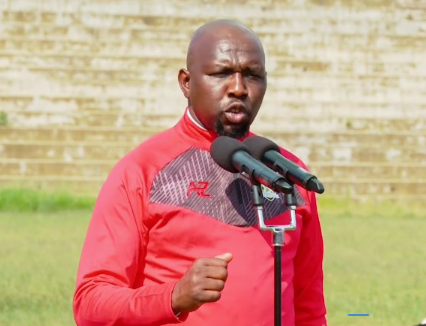Interior CS Kipchumba Murkomen has told off critics opposing the Office of the Director of Public Prosecutions’ move to charge protesters with acts of terrorism.
Murkomen challenged those opposing DPP, DCI and the criminal justice system to define various destructive acts if they are not terrorism.
Speaking on Monday, the CS said the acts include invading and burning police stations, stealing guns, destroying police living quarters and assaulting officers, burning courts, administration units, vehicles, and private businesses.
“I want everybody who is challenging us and challenging the DCI and DPP and the criminal justice system to explain to me, if you invade a police station and burn it, steal guns and burn police lines and their houses, and you beat police officer, you ban courts, you ban administration units, you ban vehicles, you ban people’s businesses, what is the crime?” he questioned.
He defined terrorism as establishing criminal gangs to invade businesses or financing individuals with crude weapons and petrol bombs to destroy private and government property.
Murkomen said that the destructive actions, such as burning installations and businesses, directly fall under this definition and are acts of terrorism.
He challenged common stereotypes of terrorists, stating that they do not necessarily avoid suits, live only in remote border areas, or fit a specific demographic.
Murkomen argued that citizens who organise and finance criminals to cause havoc, destroy property, and burn government installations under the guise of protests or demonstrations are also terrorists, not just protesters.
On Monday, ODPP defended the move to charge protesters with acts of terrorism, acknowledging the ongoing national discourse sparked by recent legal actions following the events of June 25, 2025, and July 7, 2025.
The Office said it upholds the vital role of a free press and a vibrant civil society in fostering accountability and strengthening democratic governance.
“However, the charges under the Prevention of Terrorism Act should be understood within the framework of established legal thresholds and national security imperatives rather than interpreted as efforts to suppress legitimate political expression,” ODPP said in a statement.
ODPP said preliminary investigations indicate that attacks on public offices, courts, police stations, and government personnel were not spontaneous demonstrations, but calculated and coordinated acts of violence.
These incidents, they said, were aimed to cripple essential government operations, instilling fear, and eroding public trust in democratic institutions.
The Office further stated that under Sections 2 and 4 of the Prevention of Terrorism Act, such actions qualify as acts of terrorism when intended to cause serious disruption of essential services, intimidate the public or government, or create widespread fear through targeted destruction.
